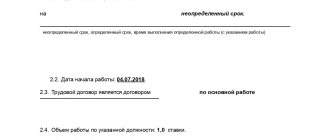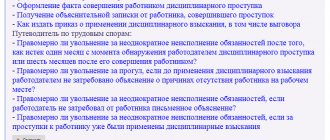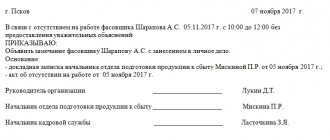Author of the article: Yulia Kaisina Last modified: January 2021 12346
If an employee does not fulfill his job duties or does it improperly, the employer has the right to impose a disciplinary sanction on him (Article 192 of the Labor Code of the Russian Federation). In most cases, the list of sanctions is limited to three points: reprimand, reprimand and dismissal. However, for some categories of workers this list is expanded. Civil servants, in a sense, are representatives of their country and authorities, so the requirements for them differ from the standard ones.
Expert commentary
Leonov Victor
Lawyer
In addition to the Labor Code, disciplinary liability of civil servants is additionally regulated by Federal Law No. 79-FZ dated July 27, 2004 “On the State Civil Service in the Russian Federation.”
Who are government employees?
Since government positions are introduced to exercise the powers of federal bodies and bodies of constituent entities of the Russian Federation, formally the state is considered the employer of such employees, and the head of the government body acts as a representative of the employer. (Article 1 of Federal Law No. 79). When entering the civil service, employees enter into a contract, their activities are financed from the federal or regional budget.
Such a service imposes a number of restrictions, for example, civil servants cannot speak publicly and evaluate the activities of government bodies if this is not part of their official duties.
Civil servants are divided into four categories (Article 9 of Federal Law No. 79):
| Managers | Heads of government bodies and their deputies. They can be appointed for a specific period or indefinitely. |
| Assistants (advisers) | Appointed to assist managers. Their term of office expires simultaneously with the change of leadership. |
| Specialists | People of different professions who ensure that government agencies fulfill their tasks and functions. |
| Supporting specialists | Employees whose tasks include economic, financial, organizational, documentation and other support for the activities of government bodies. |
The term of office of the last two categories of employees is initially unlimited.
Material liability
Finally, the last type of liability imposed on government employees is the financial liability of civil servants. How does it actually differ from the one described above? After all, if there is a need to pay a fine, a person also parts with money - therefore, he incurs material costs!
It’s simple: this is the name given to an employee’s obligation to compensate for the damage he has caused to the organization or the state. When it is necessary? Obviously, when a person committed an offense that led to significant damage. By law, no civil servant can have enough money to be able to independently, from personal reserves, pay the state or enterprise in the event of damage to the latter.
In other words, the position of a civil servant does not imply huge incomes and incredibly high financial well-being. These are all the types of legal liability of civil servants.
Types of penalties
Disciplinary sanctions that can be imposed on civil servants are listed in Art. 57 Federal Law No. 79:
- comment;
- rebuke;
- warning about incomplete job compliance;
- dismissal from the civil service on the grounds provided for in Art. 37 Federal Law No. 79.
Thus, to the three standard types of penalties, one specific one is added - a warning about incomplete compliance. As conceived by legislators, this penalty should be a signal to the person that he is not performing his duties well enough, and to take measures to correct the situation.
Important! For one disciplinary offense, only one penalty can be imposed on civil servants.
What can you be fined for?
According to the law, disciplinary sanctions are imposed for failure to perform or improper performance by a civil servant of his official duties. Important - punishment is possible only if it was his fault. If a person is not to blame for what happened (for example, he did not complete an order because it was objectively impossible), he cannot be punished.
The main responsibilities of civil servants are listed in Art. 15 Federal Law No. 79. In addition to the requirements to carry out the instructions of managers and their official duties provided for by the job regulations, there are the following points:
- comply with the Constitution of the Russian Federation, federal constitutional laws, federal laws, other regulatory legal acts of the Russian Federation, constitutions (charters), laws and other regulatory legal acts of the constituent entities of the Russian Federation and ensure their implementation;
- perform official duties in accordance with official regulations;
- carry out instructions from relevant managers given within the limits of their powers established by the legislation of the Russian Federation;
- observe the rights and legitimate interests of citizens and organizations when performing official duties;
- comply with the official regulations of the government body;
- maintain the level of qualifications necessary for the proper performance of official duties;
- not to disclose information constituting state or other secrets protected by federal law, as well as information that has become known to him in connection with the performance of official duties, including information relating to the private life and health of citizens or affecting their honor and dignity;
- protect state property, including those provided to him for the performance of official duties;
- provide, in the prescribed manner, information provided by federal law about yourself and your family members;
- report renunciation of citizenship of the Russian Federation or acquisition of citizenship of another state on the day of renunciation of citizenship of the Russian Federation or on the day of acquisition of citizenship of another state;
- comply with restrictions (Article 16 Federal Law No. 79), fulfill obligations and requirements for official conduct, not violate the prohibitions (Article 17 Federal Law No. 79) that are established by this Federal Law and other federal laws;
- inform the employer's representative about personal interests in the performance of official duties, which may lead to a conflict of interest, and take measures to prevent such a conflict.
Expert commentary
Gorchakov Vladimir
Lawyer
Thus, the activities of civil servants are regulated quite strictly, and there are quite a lot of grounds for imposing disciplinary sanctions.
Excursion into history
Civil service has been known since the times of Ancient Rome and Byzantium. In those ancient times, the apparatus of power was staffed by people to whom this post was inherited, or by those who were directly dependent on the ruler. There were no appointments, much less elective procedures. But even then it was possible to instruct other people to do what was entrusted to you, and receive payment for it yourself.
In Imperial Russia, current civil servants were called officials. There was a special Table of Ranks - a document according to which officials were arranged in a hierarchical order. Thus, the highest position - that is, rank - was occupied by the chancellor, the lowest - by the collegiate registrar. The table of ranks appeared under Peter the Great and was modified several times; at the last edit, there were twelve (instead of fourteen) positions left. You could increase your rank in several ways, one of them was by length of service (you had to work in the corresponding position for at least three or four years). There was a funny fact: there were fewer jobs themselves than there were applicants for them in the form of government employees.
At first, among the civil servants there were often representatives of the noble class, but the further they went, the fewer of them became. This was primarily due to the fact that the nobles began to receive exemption from compulsory service - therefore, they began to evade their state duties. At the beginning of the twentieth century, however, the number of bureaucrats was measured at half a million people.
Why can a civil servant be fired?
Cases where disciplinary action may lead to dismissal are listed in Art. 37 Federal Law No. 79:
- repeated failure to fulfill one’s duties without good reason, if there were other disciplinary sanctions during the year;
- truancy – absence for more than four hours in a row without a valid reason;
- appearing at work under the influence of alcohol or drugs;
- disclosure of state or other secrets protected by law, as well as official information;
- committing theft, embezzlement or intentional damage to someone else's property at the place of work, provided that this fact is confirmed by a court decision or a resolution of the body that considered the case of an administrative offense;
- making an unjustified decision by an employee of the management category that caused the unlawful use of property, violation of its safety or causing other damage to the property of a state body;
- a single gross violation by an employee of a management category of his official duties, if this caused harm to a government agency or violated the legislation of the Russian Federation.
Important! For other disciplinary offenses, if they were committed once, you cannot be dismissed from public service.
Rules for imposing penalties
When imposing a penalty, a certain procedure must be followed. Without this, the punishment will be legally considered illegal, even if formally its application is fair. The procedure is regulated by Art. 58 Federal Law No. 79 and generally coincides with a similar procedure for other categories of employees described in Art. 193 Labor Code of the Russian Federation. However, there are specific nuances here that relate mainly to the investigation of the incident.
Article 58 Federal Law No. 79 - Procedure for applying and lifting disciplinary sanctions
- Before applying disciplinary action, the employer's representative must request an explanation in writing from the civil servant. If a civil servant refuses to give such an explanation, a corresponding act is drawn up. The refusal of a civil servant to give an explanation in writing is not an obstacle to applying a disciplinary sanction.
- Before applying a disciplinary sanction, an internal review is carried out.
- When applying a disciplinary sanction, the severity of the disciplinary offense committed by a civil servant, the degree of his guilt, the circumstances under which the disciplinary offense was committed, and the previous results of the civil servant performing his official duties are taken into account.
- A disciplinary sanction is applied immediately after the discovery of a disciplinary offense, but no later than one month from the date of its discovery, not counting the period of temporary incapacity for work of a civil servant, his stay on vacation, other cases of his absence from service for good reasons, as well as the time of an internal inspection.
- A disciplinary sanction cannot be applied later than six months from the date of commission of a disciplinary offense, and based on the results of an inspection of financial and economic activities or an audit - later than two years from the date of commission of a disciplinary offense. The specified time limits do not include the time of criminal proceedings.
- A copy of the act on the application of a disciplinary sanction to a civil servant, indicating the grounds for its application, is handed over to the civil servant against signature within five days from the date of publication of the relevant act.
- A civil servant has the right to appeal a disciplinary sanction in writing to the commission of a state body on official disputes or to court.
- If, within one year from the date of application of the disciplinary sanction provided for in paragraphs 1 - 3 of part 1 of Article 57 of this Federal Law, and the penalty provided for in Article 59.1 of this Federal Law, a civil servant is not subjected to a new disciplinary sanction, he is considered to have no disciplinary sanction.
- The employer's representative has the right to remove a disciplinary sanction from a civil servant before the expiration of one year from the date of application of the disciplinary sanction on his own initiative, at the written request of the civil servant or at the request of his immediate supervisor.
When it becomes known about an offense that is subject to disciplinary liability, a written explanation is required from the employee. Refusal to provide an explanation is not an obstacle to the subsequent imposition of penalties, but must be recorded in a separate act.
Explanatory note of a civil servant (sample)
Next, it is necessary to conduct an internal audit (Article 59 of Federal Law No. 79). Based on its results, the commission draws up a conclusion, which indicates the need for disciplinary action.
Expert commentary
Kolesnikova Anna
Lawyer
When imposing a disciplinary sanction, it is necessary to take into account the severity of the offense and the circumstances of its commission, the degree of guilt of the employee and how he previously performed his duties.
Sanctions can be applied no later than one month from the date of discovery of the offense. This time does not include the period when the guilty employee was on vacation, on sick leave or absent for other valid reasons. The time required for the official check is also not taken into account.
The maximum period during which disciplinary sanctions can be applied to the perpetrator is six months from the date of commission of the offense. Thus, if the fact of the offense comes to light after seven months, it cannot be held accountable for it. An exception is violations identified as a result of a financial or audit. The statute of limitations for them is two years. If a criminal case is initiated as a result of the violation, the statute of limitations is also suspended during the investigation.
Criminal liability
The next type of liability is called criminal. What it is is clear from the name alone. Punishment for offenses of this kind inevitably entails opening a case and going to court; and even if, in the end, imprisonment, office or a fine (namely, such measures are provided by law as punishments in these cases) can be avoided, the person will still have a criminal record, which means a stain, and his reputation, as they say, will be tarnished .
Most often, a criminal case is opened under an article defining punishment for exceeding one’s official capabilities. There is even a special gradation - in which case the case can end in a fine and in what amount, in which case - in arrest and for how long, and so on. It is separately clarified that if the incident had particularly grave consequences (causing serious harm to someone, for example), then the punishment will also be more severe - either ten years of imprisonment or a three-year ban on working in certain positions.
Bringing civil servants to justice (criminal) is also possible for such an offense as official forgery - that is, a situation where a civil servant deliberately enters deliberately false information into working documents. This is also considered a violation of a criminal nature and is punishable, depending on the severity of the situation, by a fine, removal from service or correctional labor - usually for a hundred or more hours.
We should talk separately about bribes. This is also a criminal offense, the penalty for which is quite severe. Responsibility of civil servants for corruption offenses occurs regardless of whether this person took the money himself, whether it was transferred to him through someone, or whether he helped someone else receive the bribe. Even simply “turning a blind eye” to known information is criminally punishable. Even in such a situation, civil servants are held accountable for committing corruption offenses. As for the punishment in such a case, it varies depending on whether the person acted alone or with someone else (in the latter case, of course, the punishment is more severe, since there is a conspiracy). Thus, for a single corruption violation, a person can receive a fine of one hundred to five hundred thousand rubles or imprisonment for up to five years and the inability to perform certain activities. In a situation with a group offense, you can go to places not so distant for twelve years, and pay up to a million rubles. For failure to comply with a court order (this mainly concerns fines), additional sanctions are provided.
Service check
An internal inspection is carried out upon detection of a disciplinary offense; it can be initiated by a representative of the employer or another government employee. The latter must submit a written application, on the basis of which the employer’s representative makes a decision to conduct an inspection.
The procedure for internal inspection is regulated by Art. 59 Federal Law No. 79. The audit is carried out by the personnel department of the government body, the legal department and the trade union of this body. If there is an employee on the commission who is directly or indirectly interested in the results of the audit, he must recuse himself. If he does not do this, the commission's findings will be invalid.
During the inspection, the commission must establish:
- whether a disciplinary offense was actually committed;
- whether the action (inaction) contains signs of guilt;
- what reasons and circumstances contributed to the violation;
- the nature and extent of the harm that the perpetrator caused by his offense;
- circumstances that prompted the employee to write a statement about the inspection.
A month is allotted for the internal audit from the date of the decision to conduct it. At the same time, the law allows the person under investigation to be removed from work while maintaining pay. The decision on the advisability of such a measure is made by the representative of the employer.
While the audit is ongoing, the employee whose activities are being audited has the right to:
- give explanations orally or in writing, submit petitions, write statements and submit other documents to defend yourself and justify your action;
- file a complaint against the decisions and actions (inaction) of the persons conducting the inspection to the representative of the employer who appointed it;
- upon completion of the inspection, familiarize yourself with its results and materials, unless this violates the conditions for maintaining state or other secrets.
Based on the results of the inspection, the commission draws up a conclusion, which sets out the facts established during the investigation and its proposals for further sanctions against the civil servant. Based on the conclusion, an act on the application of a disciplinary sanction is drawn up. It must be handed over to the guilty employee within five days after issuance.
Regulatory regulation
The specifics of federal and municipal service are regulated by several regulations.
- Labor Code. It establishes the general procedure for formalizing labor relations (hiring and dismissal).
- Federal Law No. 58 of May 27, 2003 on the public service system in the Russian Federation. This normative act is a special law that gives the concept of such activities, determines the legal status of persons performing such service and the types of disciplinary penalties that can be imposed on employees. Based on this legal act, in the Russian Federation there are the following types of service - civil state, military and law enforcement.
- Federal Law No. 79 of July 27, 2004 on civil public service in the Russian Federation. This is also a special normative act that specifically regulates all legal relations that arise during the implementation of labor activities in the bodies of the Russian Federation, as well as in the municipality.
Special attention should be paid to existing judicial practice. From various plenums of the Supreme Court of the Russian Federation, decisions of other authorities, you can obtain information about the legal procedure for imposing penalties on certain categories of employees.
It must be remembered that a person performing the functions of government bodies is strictly prohibited from engaging in entrepreneurial activities and having income other than wages. The law only allows such employees to receive fees for teaching activities.






